|
"Commitment to ecumenism responds to the prayer of the Lord Jesus that 'they may all be one' (Jn 17:21). The credibility of the Christian message would be much greater if Christians could overcome their divisions and the Church could realize 'the fullness of catholicity proper to her in those of her children who, though joined to her by baptism, are yet separated from full communion with her.' We must never forget that we are pilgrims journeying alongside one another. This means that we must have sincere trust in our fellow pilgrims, putting aside all suspicion or mistrust, and turn our gaze to what we are all seeking: the radiant peace of God’s face” (Evangelii Gaudium, n. 244). Over the nine years that I was at St. Jude Shrine in Baltimore, Maryland, I had the opportunity to participate in and then to host an annual prayer service for Christian Unity. It became a very popular celebration and leaders from various Christian communities participated, including the Archbishop of Baltimore. To me, though, the most important people who participated were the people who went week to week to their faith communities in various parts of Baltimore, but never had the opportunity to pray together with Christians from other communities. Prayer is powerful and to underestimate its power to unite us leaves us lacking in the virtue of hope. Such hope is not naïve, but is based on firm trust in the work of the Holy Spirit. The annual Week of Prayer for Christian Unity will begin on Saturday, January 18th and conclude on the Feast of the Conversion of St. Paul on January 25th. Year after year, Christians are invited to pray that “they may be one.” St. Vincent Pallotti, patron of the Catholic Apostolate Center and founder of the Union of Catholic Apostolate, worked diligently for unity in the Church, using the liturgical Octave of the Epiphany in Rome as a means to unite in prayer members of the Eastern and Western traditions of the Catholic community who were rather disconnected from one another. This celebration was held in the city of Rome from 1836 until 1968. His feast day, on January 22nd, is in the middle of the Week of Prayer for Christian Unity. Collaboration of all Christians can lead us toward Pallotti’s vision, hope, and prayer that one day we may be “one fold, under one Shepherd, Jesus Christ” (Cf., Jn 10:16) Since our mission as the Catholic Apostolate Center is derived from the charism of St. Vincent Pallotti, who fervently prayed for such a day, we invite you to pray not only individually, but draw other Christians together in prayer. Prayer, though, is not the only thing that we can do. We can learn more about what the Roman Catholic Church teaches about the needed work for building unity among Christians. We invite you to explore the many resources that we have on our new Christian Unity page. May we also take up the call of the Catholic Church spanning from the time of the Second Vatican Council to the appeal of Pope Francis today: "The search for unity among Christians is an urgent task... We are well aware that unity is primarily a gift from God for which we must pray without ceasing, but we all have the task of preparing the conditions, cultivating the ground of our hearts, so that this great grace may be received" (Address to the Delegation of the Ecumenical Patriarchate of Constantinople, June 28, 2013). Please visit our Christian Unity resources by clicking here. **This blog was originally published on January 19, 2021.**
0 Comments
"Commitment to ecumenism responds to the prayer of the Lord Jesus that 'they may all be one' (Jn 17:21). The credibility of the Christian message would be much greater if Christians could overcome their divisions and the Church could realize 'the fullness of catholicity proper to her in those of her children who, though joined to her by baptism, are yet separated from full communion with her' We must never forget that we are pilgrims journeying alongside one another. This means that we must have sincere trust in our fellow pilgrims, putting aside all suspicion or mistrust, and turn our gaze to what we are all seeking: the radiant peace of God’s face” (Evangelii Gaudium, n. 244). Over the nine years that I was at St. Jude Shrine in Baltimore, Maryland, I had the opportunity to participate in and then to host an annual prayer service for Christian Unity. It became a very popular celebration and leaders from various Christian communities participated, including the Archbishop of Baltimore. To me, though, the most important people who participated were the people who went week to week to their faith communities in various parts of Baltimore, but never had the opportunity to pray together with Christians from other communities. Prayer is powerful and to underestimate its power to unite us leaves us lacking in the virtue of hope. Such hope is not naïve, but is based on firm trust in the work of the Holy Spirit. The annual Week of Prayer for Christian Unity will begin on Saturday, January 18th and conclude on the Feast of the Conversion of St. Paul on January 25th. Year after year, Christians are invited to pray that “they may be one.” St. Vincent Pallotti, patron of the Catholic Apostolate Center and founder of the Union of Catholic Apostolate, worked diligently for unity in the Church, using the liturgical Octave of the Epiphany in Rome as a means to unite in prayer members of the Eastern and Western traditions of the Catholic community who were rather disconnected from one another. This celebration was held in the city of Rome from 1836 until 1968. His feast day, on January 22nd, is in the middle of the Week of Prayer for Christian Unity. Collaboration of all Christians can lead us toward Pallotti’s vision, hope, and prayer that one day we may be “one fold, under one Shepherd, Jesus Christ” (Cf., Jn 10:16) Since our mission as the Catholic Apostolate Center is derived from the charism of St. Vincent Pallotti, who fervently prayed for such a day, we invite you to pray not only individually, but draw other Christians together in prayer. Prayer, though, is not the only thing that we can do. We can learn more about what the Roman Catholic Church teaches about the needed work for building unity among Christians. We invite you to explore the many resources that we have on our new Christian Unity page. May we also take up the call of the Catholic Church spanning from the time of the Second Vatican Council to the appeal of Pope Francis today: "The search for unity among Christians is an urgent task... We are well aware that unity is primarily a gift from God for which we must pray without ceasing, but we all have the task of preparing the conditions, cultivating the ground of our hearts, so that this great grace may be received" (Address to the Delegation of the Ecumenical Patriarchate of Constantinople, June 28, 2013). Please visit our Christian Unity resources by clicking here.
St. Paul offers us this challenge: “Be filled with the Spirit . . . giving thanks to God the Father at all times and for everything in the name of our Lord Jesus Christ” (Eph. 5:20) (emphasis added). Be thankful “at all times” and for “everything?” “Well that would seem to include suffering and evil. Really Lord – you want me to be thankful for that trial in my life? I'll be thankful for other things but not for that. That's impossible! Lord, at the very least, maybe you could tell me a little bit more about how I can live this radical gratitude? Help my unbelief!” This is how my prayer dialogue went with God one day as I examined my attitude toward gratitude. I thought to myself, “Do I treat gratitude as just one of those nice pious sentiments that I should do in general, but ignore when it costs me? In other words, do I make gratitude just a platitude?” I know I have treated gratitude in that way and have brushed off the Christian teaching to be thankful 'at all times' as idealistic on more than one occasion. I began to examine my soul more in depth. Why do I do this? “Usually,” I concluded, “it is because of a lack of knowledge as to why something is good for me and because my thoughts are too limited on the topic.” But God wants to break open our limited thoughts and actions. So I pressed on in my search for a deeper meaning of gratitude. Here is what I discovered. I read a book recently that changed my perspective on gratitude. The author explained that gratitude is not just a good practice to do occasionally to uplift our spiritual lives, but is actually a necessary law of every Christian spiritual life. Gratitude is not an option; it is something we have to practice regardless of temperament, disposition, or circumstance. Based on my reading, I came up with two patterns for our spiritual life: the “cycle of spiritual fruitfulness” and the “cycle of spiritual emptiness”. The cycle of spiritual fruitfulness begins with trust in God, which is nourished through faithfulness to one’s prayer life. Through prayer, gratitude grows. Gratitude is being aware of God’s many gifts in the daily happenings of our lives. Gratitude then becomes a necessary part of trust, especially in the midst of our suffering because gratitude opens up our heart to God. As we see more of God in our lives, then we give more to God and in turn are better able to receive more of God's love and grace in our life. This cycle, which begins with trust and gratitude, then repeats as we grow in love and become more loving gradually. This can be boiled down to: Trust through Prayer → Gratitude → Opens Heart → More Love The cycle of spiritual emptiness begins with a lack of trust in God and a lack of faithfulness to one's prayer life. Negativity focused on our weaknesses, what we lack, and our suffering replaces gratitude, closing our hearts and making us less capable of receiving God's love. We may even sin, like Adam and Eve in the Garden of Eden, whose ingratitude ultimately led to the first sin (Genesis 3). If we let this endure too long, then our whole life can become one big storm of sadness and anger. This can be boiled down to: Distrust through Not Praying→ Negativity → Closed Heart → Less Love Radical Gratitude Reconsidered The cycle of spiritual fruitfulness offers us several good reasons for why St. Paul instructs us to be grateful at all times and for everything with no exception. If I want to open up my heart more to the Lord and thereby love more, then I must find a way to be thankful - even for the most difficult suffering. Thankfulness is not an option reserved only for those who describe themselves as sanguine or optimists; thankfulness is a necessary part of holiness. It is therefore no coincidence that the highest Sacrament in the Church, the Eucharist, in Greek literally means “thanksgiving, gratitude.” With this in mind, I went back to my dialogue with God. I asked God for the grace to be more grateful in my daily life for everything. God, in turn, has asked me when I am tempted to be ungrateful and negative to make an act of trust in the moment and find something to be grateful for – health, the fresh crisp autumn air perhaps, or even more profoundly – my daily Sacrament with my wonderful wife – and thereby to become more aware of His love in my life. Slowly then, I become a little more grateful and a little less negative. Eventually I hope to build a habit of radical gratitude for every occasion in my life. This gratefulness does not come overnight and does not necessitate a formal act of thankfulness at every moment. As I become more grateful in those little moments, I will not only be able to resist ingratitude in the more difficult moments, but will also be better able to be grateful even for new sufferings. In this way, I am trying slowly to become thankful at all times by committing to a few acts of trust each day through gratitude. Radical gratitude is possible, but only through God’s wonderful grace! Through grace, I have come to learn the importance of radical gratitude and the cycle of spiritual fruitfulness. I choose the cycle of spiritual fruitfulness. What cycle are you on? Come Holy Spirit, make all of us more radically grateful! As we remember Rev. Martin Luther King Jr. on this American federal holiday, I invite you to join me in reflecting on his dream for the United States and for the world. Rev. King fought for equality and justice in the United States using nonviolence. He helped empower American society to look past differences and come together through love by leading people in prayer and using words paired with non-violent actions. As a Baptist minister, Rev. King upheld Christian ideals and spoke to the hearts of all those facing injustice. He personally felt and lived through discrimination and had his share of fear and uncertainty. Yet through these hardships, he led others to see truth in justice and civil rights by organizing non-violent marches and protests, and by preaching unity.
Much of what Rev. King said through his words and his non-violent actions can be compared to the teachings of Christ. In the Gospel of John, for example, Peter tries to defend Jesus from a large crowd trying to arrest him in the Garden of Gethsemane. Jesus tells Peter to “put the sword in its sheath” and in Matthew’s Gospel adds, “all those who take up the sword shall perish by the sword.” In doing so, Christ tells Peter that fighting back with the same means as the enemy will get him nowhere. Earlier in Matthew’s Gospel, while he was preaching about the Beatitudes in the Sermon on the Mount, Jesus reminded his disciples, “You have heard that it was said, ‘Love your neighbor and hate your enemy.’ But I tell you, love your enemies and pray for those who persecute you, that you may be children of your Father in heaven” (Matthew 5:43-45). Christ preached forgiveness through love and mercy throughout his ministry and demonstrated this in a powerful way throughout his arrest and Passion. Jesus demonstrated how love can change hearts and save lives. Martin Luther King Jr. imitated this response. His promotion of unity has had powerful repercussions on our society that are still felt to this day. Unfortunately, discrimination in various forms continues. Our next generation sees pain, division, and fear in the news and TV shows, on social media, and even sometimes right outside their doors. However, those who cultivate empathy for others can make Rev. Martin Luther King Jr.’s dream come true today and breathe life into Christ's teachings in the Gospel. So how can you empower the nation with love? How can you teach through your actions how to live out Christian values and Catholic Social Teaching? In what ways can you help bring understanding and empathy to others? I invite you to reflect on the Beatitudes from Jesus’ Sermon on the Mount (Mt. 5:3-10) as a way to embark on this journey toward building peace! “Now when Jesus saw the crowds, he went up on a mountainside and sat down. His disciples came to him, and he began to teach them. He said: 'Blessed are the poor in spirit, for theirs is the kingdom of heaven. Blessed are those who mourn, for they will be comforted. Blessed are the meek, for they will inherit the earth. Blessed are those who hunger and thirst for righteousness, for they will be filled. Blessed are the merciful, for they will be shown mercy. Blessed are the pure in heart, for they will see God. Blessed are the peacemakers, for they will be called children of God. Blessed are those who are persecuted because of righteousness, for theirs is the kingdom of heaven. Blessed are you when people insult you, persecute you and falsely say all kinds of evil against you because of me. Rejoice and be glad, because great is your reward in heaven, for in the same way they persecuted the prophets who were before you.” Please visit our website to learn more about Cultural Diversity, Catholic Social Teaching and Christian Unity. “Are you junior Knights of Columbus?” This was the question posed to me by an elderly woman during my freshman year of college as I joined my brother knights for 8am Mass at the Basilica of the National Shrine of the Immaculate Conception adjacent to The Catholic University of America’s (CUA) campus. It was a Friday morning, and of course I loathed getting out of bed. However, I had made a commitment and I wanted to follow through as best I could.
Some of the upperclassmen knights that were with me answered politely back, “No, ma’am, we’re just regular knights.” She smiled and wished us well, clearly happy to see young men going to Church. Back then, our council membership was small, but we had big aspirations. All of the guys that I joined the Knights with had the same idea in mind. Here we were, embarking on a new chapter of our life. We wanted our faith to be enriched and strengthened. We wanted to serve the community and neediest among us. We wanted to find friends who would support us in our endeavors. The Knights of Columbus are a 1.9 million member Catholic fraternal organization. Founded in 1882 by the Venerable Servant of God Fr. Michael J. McGivney, the order is founded on the principles of charity, unity, fraternity, and patriotism. Originally formed to provide financial assistance to members and their families, the order today continues to do so through its insurance program, which funds its charitable works. The Knights of Columbus are organized into local councils, often housed within parishes, and are governed internationally by a supreme council headquartered in New Haven, Connecticut – where the order was founded. As the Knights of Columbus meet this week in Toronto, Canada for their Supreme Convention – their international convention during which they elect officers, pass resolutions, and report on membership, etc.—I wanted to share my story of the impact this organization has had on my life. Growing up, I always wanted to get involved in extracurricular activities at school and within my community. I joined the student council, led clubs, and served as a counselor to other students. When I arrived at college, things were no different. The CUA council of the Knights of Columbus was the first group I joined. It soon became apparent to me that I had found just what I needed – what I had been looking for as a new college student. This group would help me realize that my faith should not just be important - but it should be the cornerstone of my being. As a knight, I have grown in fraternity with my brothers. I have been able to serve my community through charitable fundraisers and service opportunities. I have supported veterans and active-duty military – something that the order encourages no matter which country a council is in. I have been able to instill in others the characteristics of true chivalry. Because of the Knights of Columbus, I have become a better Catholic and a better man. I would encourage any Catholic male to think about joining this organization. A similar organization for women is the The Catholic Daughters of the Americas. If you are already a knight, I would encourage you to stay involved and help to recruit others. As our chaplain is fond of saying, “What you give to the council, you will get back one hundredfold.” I cannot endorse this statement enough. Let me leave you with a few lines from a song that we sing at the end of our council meetings: We have a mission great True to our Church and State Onward we move We dry the mourner's tear The tired heart we cheer Faith in our works appear, Upheld by Love. These few lines, I think, embody just what it means to be a Knight of Columbus. Like many of you, I have been following Pope Francis’ visit rather closely. Undoubtedly, his presence has impacted each of us in different ways, and I am very excited about the words and actions to come in the days ahead. As I sit here in my office with an unusual lull in activity, I am struck by two ideas our Holy Father has articulated, but are getting very little play in the news. The first idea comes from his address to the U.S. Congress. While highlighting Abraham Lincoln, he emphasized unity, and Lincoln’s great struggle to bring union, freedom, and peace to a divided and war ravaged nation. Francis named the delicate balance of rejecting fundamentalism that threatens these great virtues that Lincoln fought for, while not sacrificing those same liberties in an effort to defeat these threats. Within that balance, our Pope names the danger of seeing the world in non-negotiable black and white. I am particularly caught by this because I am often far too quick to judge, especially in a political or theological situation. If people don’t think like me, I reject their ideas as closed-minded nonsense. This line of thinking is all too common in our society. 24-hour news channels that cater to particular political views, blogs and podcasts that target niche groups, and seemingly endless gridlock in Washington reiterates to us constantly that dialogue is overrated, and if you don’t agree with me I have no time for you. Unfortunately, there is a great danger in seeing things in black and white. When we see things in black and white we claim the moral compass; we claim to know what is righteous and what is sin. And when we get trapped in that line of thinking, there is no more room for anyone else in our lives, not even God. We declare our independence from what we view as wrong only to discover that we can no longer discuss and dialogue with those around us. Nothing anyone has to say is worth listening to. Here is where the Pope’s message strikes deepest. President Lincoln in his first and primary purpose fought the Civil War to preserve the union, to keep these United States from dividing into isolation. Lincoln chose openness and dialogue, and that is where Pope Francis is calling all of us today. For too long I have looked down on those I disagree with thinking they are not as nuanced or educated as I am. Yet God speaks in history, and if I fail to speak with and be open to my sisters and brothers, how can I hear God? How can I grow? And most importantly, how can I live in union as a member of the Church and as a citizen of this country, if I fail to dialogue and work in communion to realize the Kingdom of God and build a more perfect union? The second chord that struck me came from the address to the U.S. Bishops at St. Matthew’s Cathedral. While watching the reflection, I was unsure what the Pope was going to say, but I was deeply moved by the compassionate urgency he had while addressing the mission of the church in the United States. He acknowledged the heavy workload, the damaging reality of the sexual abuse crisis, and the corrosiveness of secular culture. However, he made very clear that it was in this context that all of us who minister to God’s people are charged with finding some way to evangelize, to bring people into a relationship with Jesus Christ as his disciples. In my new job I am struggling to engage young adults in their 20’s and 30’s. I have a loose plan, and we are having our first event in a few weeks. However, like anything new, I am having doubts about how successful it will be in bringing young adults back to Christ. I went through all of this training and education and I don’t have a sure answer for how to lead people to discipleship. What if no one shows up? Through that cloud of doubt, there was the Pope speaking to a cathedral full of bishops, but yet also speaking to my fears. Evangelization is the most important work. We must keep trying. We must keep praying, and we must keep going. Only God builds the Church, but we must keep removing barriers and facilitating encounter, so that the seeds of faith may be watered and eventually produce much fruit. These last few days have already made for an incredible papal visit. The headlines will undoubtedly continue to be filled with the Pope’s stance on particular issues, and on his discussions at the World Meeting of Families. Through all of that, try to listen to the words surrounding the hot buttoned issues because there Francis is not telling us what to believe, he is rather telling us how to live as human beings. Pope Francis, in his straight talk and unassuming persona, has figured out how to remove those barriers to faith, and in his words over the last few days, I can’t help but feel that Christ has spoken directly to me. Editor's Note: This post was originally published on Catholic How and was reprinted with permission
Every family gathering, I look forward to catching up with my relatives over good food, interesting stories, and lively table talk. Inevitably in my family, the conversation transitions to religion. It’s a heated discussion given that my immediate family is Catholic, whereas the rest (on my mother’s side) is Coptic Orthodox. From then on, our respective faith traditions are more or less pitted against each other as theological matters are analyzed and debated. Of course recognizing that at the core we are Christians united to our Lord through our baptism, we continue to respect each other’s beliefs (cf. Galatians 3:27). We still pray and hope for unification, too, though there are disagreements among us as to how this might occur. In any case, these opportunities to evangelize are enjoyable, as each of us advocates for the faith that has shaped our lives and beings.
“The restoration of unity among all Christians is one of the principal concerns of the Second Vatican Council.” This first sentence of Unitatis Redintegratio, the Decree on Ecumenism is still surprising to many Catholics. It set the stage for the last fifty years of Catholic dialogue and conversation with our Orthodox, Protestant, and Anglican brothers and sisters in the Faith. The Decree gives “Catholic Principles on Ecumenism.” Even Jesus, at the Last Supper, prayed for unity, that His disciples be one (see John 17:21). Ultimately, Christian unity is God’s will and the work of the Holy Spirit rather than solely our own. The Decree nevertheless urges all Catholics to participate in the noble work of Christian unity (#4). This work— our conversation, dialogue, and service with others— calls for complete honesty. We must represent the position of others with truth and fairness and never be dismissive or ignorant of the other traditions. By not pointing fingers and recognizing that any blame for schisms in the Church is shared by all, a heartfelt and meaningful dialogue can be achieved. Ecumenical dialogue, rather than making us less Catholic, makes us more so. By searching within our own faith, we are made aware of the commonalities that we share with our fellow Christians. As for the divergences that we also discover in doing so, it is the Holy Spirit who will help us to overcome them; ecumenical conversation leads us back to prayer: “This change of heart and holiness of life, along with public and private prayer for the unity of Christians, should be regarded as the soul of the whole ecumenical movement, and merits the name ‘spiritual ecumenism’” (#8). To engage others, then, a spirit of humility, honesty, patience, and gentleness is needed. After all, the Church is stronger when its members are open to and inclusive of all traditions. How can the Church, being commissioned to spread the Truth to all, fully honor her call if she does not communicate well with fellow Christians (see Matthew 28:19-20, cf. 1 Corinthians 10-15)? Though we may not agree on every theological point, Christians of all traditions continue to work towards the unification and the strengthening of Christ’s body (see 1 Corinthians 12:12-27). We worship the same Lord, Jesus Christ, Who sacrificed Himself for all without distinction. We answer the same call to evangelize and offer ourselves in loving service to all. The holy sacrifice of the Mass offered and the reception of the sacraments by Christians each day are the same gifts and sources of grace from God. And the ultimate witness of martyrs for their belief in Christ across the world and time further lead us on the road to unity. The Church continues to face uncertain times, just as she always has; Christ, likewise, remains steadfast in His promise to stand by her (see Matthew 16:18, John 16:33). Thomas Wong is an undergraduate at The Catholic University of America in Washington, D.C. This week (January 18-25) is the annual Week of Prayer for Christian Unity. We are invited to pray for the unity of the Christian Family. Celebrated for more than 100 years, unity is more than just an ideal, for the Christian it is an obligation to be carried out in prayer and in shared commitment to building the kingdom of God.
The roots of praying for unity are fixed in Jesus’ prayer, near the time of his death, “… so that they may all be one, as you, Father, are in me and I in you, that they also may be in us, that the world may believe that you sent me” (John 17:21). The Catholic Church’s participation in ecumenical endeavors took new shape in the Second Vatican’s Council’s commitment to build stronger ties across Christian communities. Building on the work of the Council, St. John Paul II called the church to make unity an exercise of spiritual ecumenism, noting that the disunity of Christians weakens the credibility of the Gospel. In an address to the church in Oceania he reflected “In the work of ecumenism, it is essential that Catholics be more knowledgeable about the Church’s doctrine, her tradition and history, so that in understanding their faith more deeply they will be better able to engage in ecumenical dialogue and cooperation. There is a need too for ‘spiritual ecumenism’, by which is meant an ecumenism of prayer and conversion of heart. Ecumenical prayer will lead to a sharing of life and service where Christians do as much together as is possible at this time. ‘Spiritual ecumenism’ can also lead to doctrinal dialogue or its consolidation where it already exists” (Ecclesia in Oceania, 23). This reflection of St. John Paul echoes in the theme for this year’s celebration which is “Give me a drink.” Taken from John’s account of Jesus’ encounter with the Samaritan woman at the well (John 4:1-42), it emphasizes the importance of encountering one another in dialogue and celebrating that all Christians drink from the common well of the life-giving waters of Jesus’ life, death and resurrection. In our encounter with Christians, in our dialogue, in our shared ministry of charity we learn the richness of one another’s tradition and we more easily see ourselves through the eyes of Jesus; who we are and who we can become. In the Decree on Ecumenism, written at the Second Vatican Council, the unity that can be found in Christ magnifies the invitation of this year’s celebration to drink of the water Our Lord has to offer. Before the whole world let all Christians confess their faith in the triune God, one and three in the incarnate Son of God, our Redeemer and Lord. United in their efforts, and with mutual respect, let them bear witness to our common hope which does not play us false. In these days when cooperation in social matters is so widespread, all men without exception are called to work together, with much greater reason all those who believe in God, but most of all, all Christians in that they bear the name of Christ. Cooperation among Christians vividly expresses the relationship which in fact already unites them, and it sets in clearer relief the features of Christ the Servant….All believers in Christ can, through this cooperation, be led to acquire a better knowledge and appreciation of one another, and so pave the way to Christian unity. Decree on Ecumenism, 12 Susan Timoney is the Assistant Secretary for Pastoral Ministry and Social Concerns for the Archdiocese of Washington and teaches spirituality for Saint Joseph’s College Online. She is also an adviser to the Catholic Apostolate Center. If you would like to know more about Christian Unity, please see our resource page! When I was four years old, my parents decided they wanted to put me in some type of pre-school before I entered kindergarten the next year. Being the oldest child, there was no precedent for where to go. My parents spent weeks looking at different preschools and settled on a small Lutheran school just up the street from our house. The appeal was its location and small class size. Knowing they would be enrolling me at the local Catholic school after preschool, my parents were not too concerned about sending me to a Lutheran preschool.
I started my first day in a class with 8 other children. There were seven little boys with a habit of biting, and then one other girl. Naturally, this girl and I became best friends. We really had no other choice. Even though we only went to school together for one year, we remain friends to this day and I look forward to attending her wedding next year. I am her token Catholic friend and she is my token Lutheran friend. We have grown together and share our faiths with each other. Later this week is the start of the Week of Prayer for Christian Unity (January 18-25) and it has made me think a lot about my “token Lutheran friend.” I remember a conversation we had when we were ten years old, after a friend of hers had asked her why we were still friends since I was Catholic. Sitting in her kitchen, we talked about how to us, it didn’t matter at all. We were defined by more than our individual faiths and united in a shared belief of Christ as the one through whom we can achieve salvation. Today, it surprises me how theologically intense some of our discussions got, even at young ages. The week of Prayer for Christian Unity is a reminder to all of us that the Christian faith, while made up of many different denominations, is still universal. There are differences that divide the different Christian faiths, but this coming week is a time to focus on the things that unite us. The idea of New Evangelization reminds us as Catholics to share our faith and spread the Gospel. I leave you with this scripture passage, selected as the biblical text for the 2014 Prayer for Christian Unity. St. Paul reminds us that we are all united in our faith in Christ, and I challenge you to use this week as a time to reflect on how we as a Catholic community can grow in faith with our Christian brothers and sisters. “Now I appeal to you, brothers and sisters, by the name of our Lord Jesus Christ, that all of you should be in agreement and that there should be no divisions among you, but that you should be united in the same mind and the same purpose. For it has been reported to me by Chloe’s people that there are quarrels among you, my brothers and sisters. What I mean is that each of you says, ‘I belong to Paul’, or ‘I belong to Apollos’, or ‘I belong to Cephas’, or ‘I belong to Christ.’ Has Christ been divided? Was Paul crucified for you? Or were you baptized in the name of Paul? I thank God that I baptized none of you except Crispus and Gaius, so that no one can say that you were baptized in my name. (I did baptize also the household of Stephanas; beyond that, I do not know whether I baptized anyone else.) For Christ did not send me to baptize but to proclaim the gospel, and not with eloquent wisdom, so that the cross of Christ might not be emptied of its power.” Check out the Catholic Apostolate Center’s resources on Christian unity here. Rebecca Ruesch is the Blog Editor for the Catholic Apostolate Center |
Details
Archives
July 2024
Categories
All
|
About |
Media |
© COPYRIGHT 2024 | ALL RIGHTS RESERVED

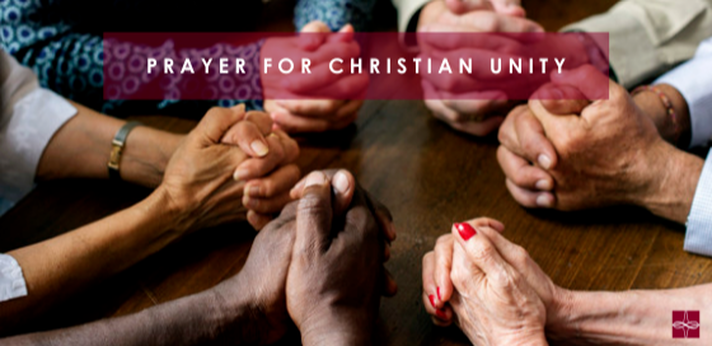
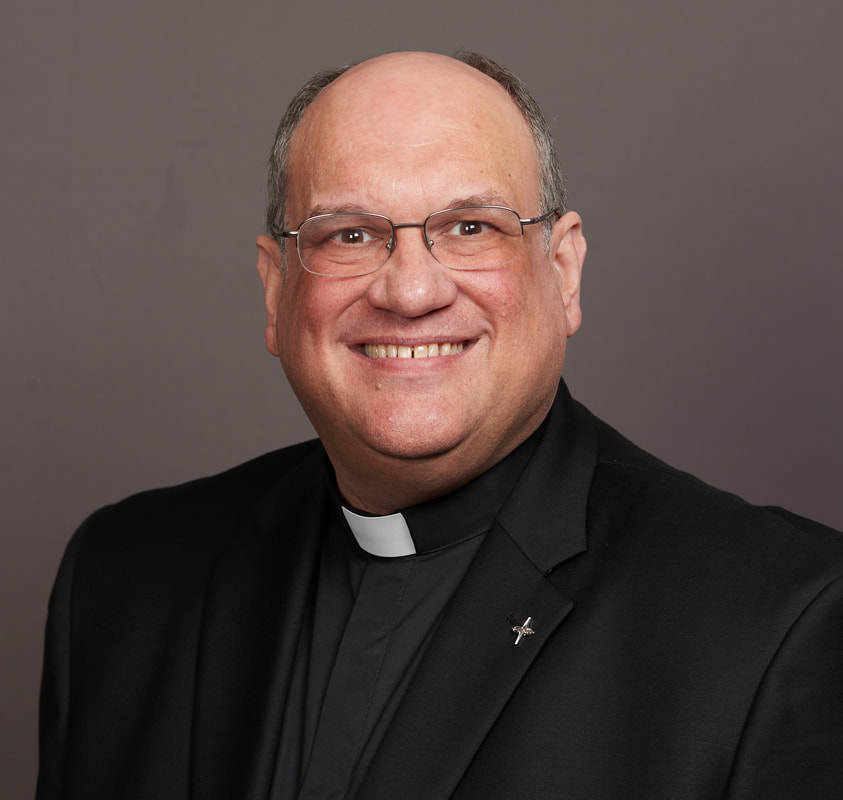
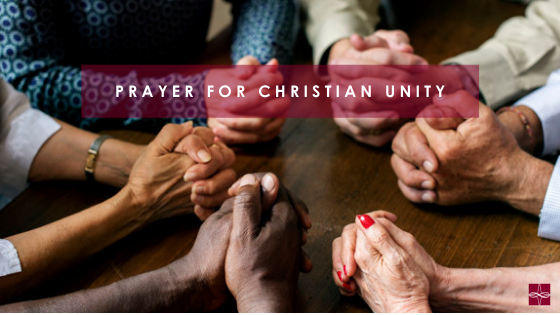
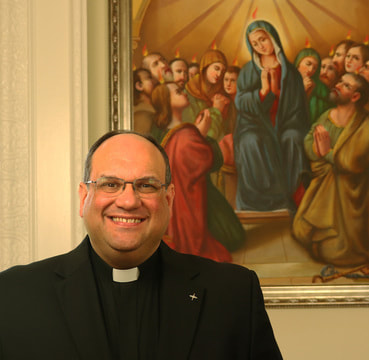




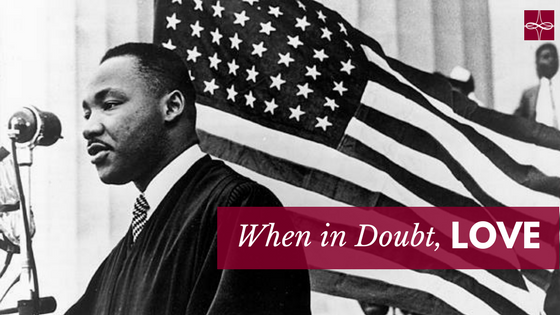

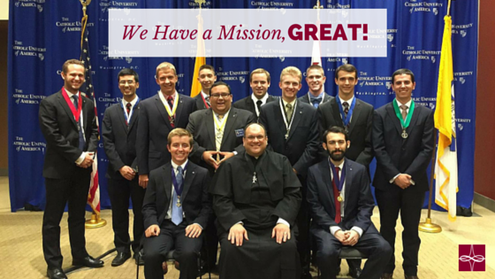

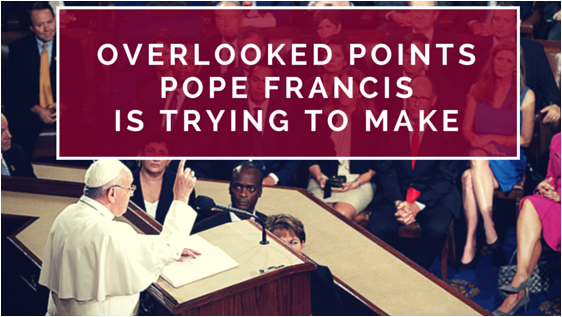

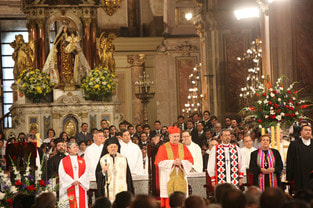
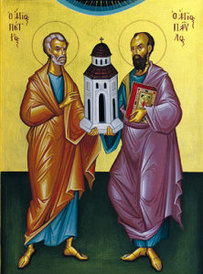

 RSS Feed
RSS Feed